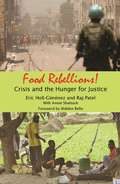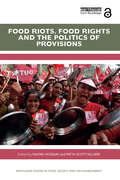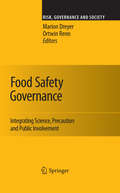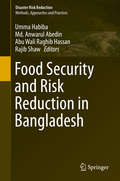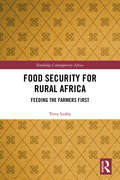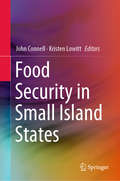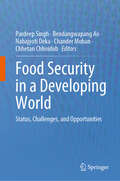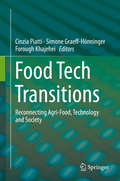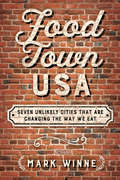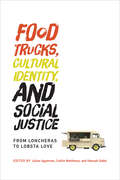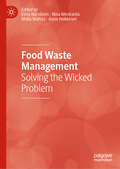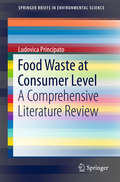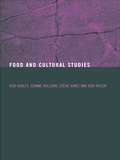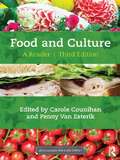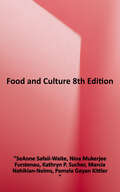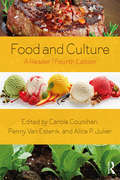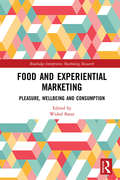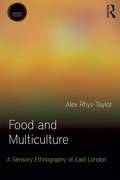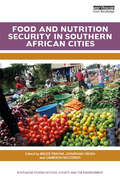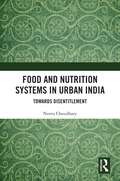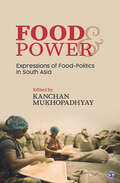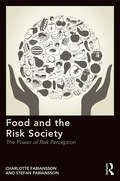- Table View
- List View
Food Rebellions
by Raj Patel Eric Holt-GimenezToday there are over a billion hungry people on the planet, more than ever before in history. While the global food crisis dropped out of the news in 2008, it returned in 2011 (and is threatening us again in 2012) and remains a painful reality for the world's poor and underserved. Why, in a time of record harvests, are a record number of people going hungry? And why are a handful of corporations making record profits? In Food Rebellions! Crisis and the Hunger for Justice, authors Eric Holt-Giménez and Raj Patel with Annie Shattuck offer us the real story behind the global food crisis and document the growing trend of grassroots solutions to hunger spreading around the world.Food Rebellions! contains up to date information about the current political and economic realities of our food systems. Anchored in political economy and an historical perspective, it is a valuable academic resource for understanding the root causes of hunger, growing inequality, the industrial agri-foods complex, and political unrest. Using a multidisciplinary approach, Holt-Giménez and Patel give a detailed historical analysis of the events that led to the global food crisis and document the grassroots initiatives of social movements working to forge food sovereignty around the world. These social movements and this inspiring book compel readers to confront the crucial question: Who is hungry, why, and what can we do about it?
Food Riots, Food Rights and the Politics of Provisions (Routledge Studies in Food, Society and the Environment)
by Naomi Hossain Patta Scott-VilliersThousands of people in dozens of countries took to the streets when world food prices spiked in 2008 and 2011. What does the persistence of popular mobilization around food tell us about the politics of subsistence in an era of integrated food markets and universal human rights? This book interrogates this period of historical rupture in the global system of subsistence, getting behind the headlines and inside the politics of food for people on low incomes. The half decade of 2007–2012 was a period of intensely volatile food prices as well as unusual levels of popular mobilization, including protests and riots. Detailed case studies are included here from Bangladesh, Cameroon, India, Kenya and Mozambique. The case studies illustrate that political cultures and ways of organizing around food share much across geography and history, indicating common characteristics of the popular politics of provisions under capitalism. However, all politics are ultimately local, and it is demonstrated how the historic fallout of a subsistence crisis depends ultimately on how the actors and institutions articulate, negotiate and reassert their specific claims within the peculiarities of each policy. A key conclusion of the book is that the politics of provisions remain essential to the right to food and that they involve unruliness. In other words, food riots work. The book explains how and why they continue to do so even in the globalized food system of the 21st century. Food riots signal a state unable to meet a principal condition of its social contract, and create powerful pressure to address that most fundamental of failings..
Food Safety Governance
by Ortwin Renn Marion DreyerThis book offers a detailed analysis and a set of carefully measured suggestions towards achieving greater integration of science, precaution, and public involvement in current arrangements for European food safety governance. The devised governance framework provides a distinctive system of methodologies, participatory processes, and institutional configurations that demonstrates practical advice of how complex and conflicting food safety demands might be reconciled. At the core of the suggestions for procedural reform is a design with four governance stages (framing, assessment, evaluation, management, with participation and communication as cross-cutting activities), and an organisation into four assessment and management tracks distinguishing between risk-, precaution-, concern- and prevention-based approaches. In addition, the book suggests an innovative food safety interface structure designed to improve the politics-science-society coordination throughout the governance process.
Food Security and Risk Reduction in Bangladesh
by Rajib Shaw Umma Habiba Md. Anwarul Abedin Abu Wali Raghib HassanThis book draws examples from food security issues in Bangladesh. The book is structured around those issues and underlying causes of food security, the implications from different sectors, policy analysis, and the role and actions of various stakeholders from different sectors to ensure food security. Bangladesh is situated in a climatically vulnerable position and is impacted frequently by such climatic hazards as floods, cyclones, droughts, and salinity intrusion. Due to global atmospheric changes, abrupt shifts in climatic conditions severely affect Bangladesh's agriculture. Although Bangladesh has made significant progress in increasing domestic production of food grain, if the production of major cereals is hampered due to climate change, food security will be in jeopardy. Most estimates show that a huge amount of additional food grain will be required to feed the growing population of the country. Ensuring food security for all is the overarching goal of Bangladesh's national food policy. Therefore, ensuring food security in the future requires a great deal of additional effort in yield improvement, with limited scope for expanding the area under cultivation. The primary target readers for this book are students and researchers in the fields of environment, disaster risk reduction, and climate change studies. The book will provide them with a good idea of the current trend of research in the field and will furnish basic knowledge on this important topic. Another target group comprises practitioners and policy makers, who will be able to apply collective knowledge to policy and decision making.
Food Security for Rural Africa: Feeding the Farmers First (Routledge Contemporary Africa)
by Terry LeahyAt least fifty years of projects aimed at the rural poor in Africa have had very little impact. Up to half of the children of these countries are still suffering from stunting and malnutrition. Soil degradation and poor crop yields are ubiquitous. Projects are almost always aimed at helping local people to solve their problems by growing for the market. In some countries, projects link poor villagers into cooperatives to produce a commercial output. In other countries, projects target more competent entrepreneurial villagers. Almost all these projects fail after several years. Even those that are successful make few inroads into the problems. While the slogan 'feeding the farmers first' comes from the Philippines, it is particularly applicable to much of Africa, where household food security can come from household production. This book explains how projects can be designed that increase food security through subsistence production. Focusing on particular people and projects, it gives a sociological analysis of why this is so difficult to manage. This book challenges the models promoted by academics in the field of development studies and argues against the strategies adopted by most donor organizations and government bodies.It explains why commercial projects have been so ubiquitous even though they rarely work. It gives practical tips on how to set up villages and farms to achieve sustainable solutions that also provide plenty of nutritious food. The book is written to be accessible and engaging. For anyone planning to work in the rural areas of Africa, this book is required reading.
Food Security in Small Island States
by John Connell Kristen LowittThis book provides a contemporary overview of the social-ecological and economic vulnerabilities that produce food and nutrition insecurity in various small island contexts, including both high islands and atolls, from the Pacific to the Caribbean. It examines the historical and contemporary circumstances that have accompanied the shift from subsistence production to the consumption of imported, processed foods and drinks, and the impact of this transition on nutrition and the rise of non-communicable diseases. It also assesses the challenges involved in reversing this trend, and how more effective social and economic policies, agricultural and fisheries strategies, and governance arrangements could promote more resilient and sustainable small island food systems. It offers both theoretical and practical perspectives, and brings together a broad range of policy areas, e.g. agriculture, food, commerce, health, planning and socio-economic policy.Given its scope, the book offers a valuable resource for a range of disciplines in a number of regional contexts, and for the growing number of scholars and practitioners working on and in small island states. It will be of particular value as the first book to examine the diversity and commonalities of island states around the globe as they confront issues of food security.
Food Security in a Developing World: Status, Challenges, and Opportunities
by Pardeep Singh Bendangwapang Ao Nabajyoti Deka Chander Mohan Chhetan ChhoidubThe book tries to answer the most fundamental question of whether there is a link between abundant food supply and economic growth with respect to a higher degree of human development. In order to have flourishing economic growth within a country the need for a food security system is a must. The world as we know is faced with shortages of food supply which has been a major factor in the country's economic development. The book is an attempt to understand the problems and current situation of food systems in the developing world. It focuses on the pathways to understand the challenges that it faces and predict future scenarios. The motive is to create academic literature to understand the basis of sustainable food security. The social, economic, and political factors become the main theme of the book. It focuses on the interdisciplinary nature of food security. Many a time we only understand the idea of food security through the lens of scientific nature but in the meantime, it forgets the other important factors that are governing the issue of food security. The inclusion of the cases section in the book helps to outline the current scenarios of the developing world. It helps to formulate a pathway or a way forward to understand the causes of food security. Food has now become a political context in the international system. The need for analyzing the political angle is necessary. The context of innovations and technological developments forms an important part of food security. The critique of existing policy systems across the developing world is a must need discussion as it is the policies that will make the food systems sustainable. Last but not least is to look at how the global food systems work and how far it has been able to fix the problems of food insecurity in the developing world. Overall, the book is an excellent interdisciplinary food security literature.
Food Stamps and Income Maintenance
by Maurice MacdonaldThis monograph evaluates effects of the Food Stamp program on recipient well-being and related benefits for taxpayers and the food industry.
Food Tech Transitions: Reconnecting Agri-Food, Technology and Society
by Cinzia Piatti Simone Graeff-Hönninger Forough KhajeheiThe food industry is now entering a transition age, as scientific advancements and technological innovations restructure what people eat and how people think about food. Food Tech Transitions provides a critical analysis of food technology and its impact, including the disruption potential of production and consumption logic, nutrition patterns, agronomic practices, and the human, environmental and animal ethics that are associated with technological change.This book is designed to integrate knowledge about food technology within the social sciences and a wider social perspective. Starting with an overview of the technological and ecological changes currently shaping the food industry and society at large, authors tackle recent advancements in food processing, preserving, distributing and meal creation through the lens of wider social issues.Section 1 provides an overview of the changes in the industry and its (often uneven) advancements, as well as related social, ecological and political issues. Section 2 addresses the more subtle sociological questions around production and consumption through case-studies. Section 3 embraces a more agronomic and wider agricultural perspective, questioning the suitability and adaptation of existing plants and resources for novel food technologies. Section 4 investigates nutrition-related issues stemming from altered dietary patterns. Finally, Section 5 addresses ethical questions related to food technology and the sustainability imperative in its tripartite form (social, environmental and economic).The editors have designed the book as an interdisciplinary tool for academics and policymakers working in the food sciences and agronomy, as well as other related disciplines.
Food Town, USA: Seven Unlikely Cities That are Changing the Way We Eat
by Mark WinneLook at any list of America's top foodie cities and you probably won't find Boise, Idaho or Sitka, Alaska. Yet they are the new face of the food movement. Healthy, sustainable fare is changing communities across this country, revitalizing towns that have been ravaged by disappearing industries and decades of inequity.What sparked this revolution? To find out, Mark Winne traveled to seven cities not usually considered revolutionary. He broke bread with brew masters and city council members, farmers and philanthropists, toured start-up incubators and homeless shelters. What he discovered was remarkable, even inspiring.In Bethlehem, Pennsylvania, once a company steel town, investment in the arts has created a robust new market for local restaurateurs. In Alexandria, Louisiana, "one-stop shopping” food banks help clients apply for health insurance along with SNAP benefits. In Jacksonville, Florida, aeroponics are bringing fresh produce to a food desert.Over the course of his travels, Winne experienced the power of individuals to transform food and the power of food to transform communities. The cities of Food Town, USA remind us that innovation is ripening all across the country, especially in the most unlikely places.
Food Trucks, Cultural Identity, and Social Justice: From Loncheras to Lobsta Love (Food, Health, and the Environment)
by Julian Agyeman Caitlin Matthews Hannah SobelAspects of the urban food truck phenomenon, including community economic development, regulatory issues, and clashes between ethnic authenticity and local sustainability.The food truck on the corner could be a brightly painted old-style lonchera offering tacos or an upscale mobile vendor serving lobster rolls. Customers range from gastro-tourists to construction workers, all eager for food that is delicious, authentic, and relatively inexpensive. Although some cities that host food trucks encourage their proliferation, others throw up regulatory roadblocks. This book examines the food truck phenomenon in North American cities from Los Angeles to Montreal, taking a novel perspective: social justice. It considers the motivating factors behind a city's promotion or restriction of mobile food vending, and how these motivations might connect to or impede broad goals of social justice. The contributors investigate the discriminatory implementation of rules, with gentrified hipsters often receiving preferential treatment over traditional immigrants; food trucks as part of community economic development; and food trucks' role in cultural identity formation. They describe, among other things, mobile food vending in Portland, Oregon, where relaxed permitting encourages street food; the criminalization of food trucks by Los Angeles and New York City health codes; food as cultural currency in Montreal; social and spatial bifurcation of food trucks in Chicago and Durham, North Carolina; and food trucks as a part of Vancouver, Canada's, self-branding as the “Greenest City.”ContributorsJulian Agyeman, Sean Basinski, Jennifer Clark, Ana Croegaert, Kathleen Dunn, Renia Ehrenfeucht, Emma French, Matthew Gebhardt, Phoebe Godfrey, Amy Hanser, Robert Lemon, Nina Martin, Caitlin Matthews, Nathan McClintock, Alfonso Morales, Alan Nash, Katherine Alexandra Newman, Lenore Lauri Newman, Alex Novie, Matthew Shapiro, Hannah Sobel, Mark Vallianatos, Ginette Wessel, Edward Whittall, Mackenzie Wood
Food Waste Management: Solving the Wicked Problem
by Elina Närvänen Nina Mesiranta Malla Mattila Anna HeikkinenThis book focuses on the crucial sustainability challenge of reducing food waste at the level of consumer-society. Providing an in-depth, research-based overview of the multifaceted problem, it considers environmental, economic, social and ethical factors. Perspectives included in the book address households, consumers, and organizations, and their role in reducing food waste. Rather than focusing upon the reasons for food waste itself, the chapters develop research-based solutions for the problem, providing a much-needed solution-orientated approach that takes multiple perspectives into account.Chapters 1, 2, 12 and 16 of this book are available open access under a CC BY 4.0 license at link.springer.com
Food Waste at Consumer Level: A Comprehensive Literature Review (SpringerBriefs in Environmental Science)
by Ludovica PrincipatoThis book presents what is the state-of-the-art in the field of the food waste phenomenon at consumer level, including a thorough literature review, and it highlights trends in the field. It provides a comprehensive starting point for future research. Food waste represents a major public policy issue, which is included in the UN Sustainable Development Goals. In this context, the present work identifies the most important definitions given to food waste and its environmental, social and economic impacts. With a comprehensive literature review that covers a forty-year time span (1977-2017), this book highlights the multiple, complex facets of food waste at the consumer level. Drawing from behavioural and marketing theories, it proposes a new theoretical framework with the aim to better explain food waste behaviour. Extensive research is being carried out on the main worldwide initiatives (both public and private) and food policies aimed at tackling the phenomenon.
Food and Cultural Studies (Studies in Consumption and Markets)
by Steve Jones Ben Taylor Joanne Hollows Bob AshleyWhat and how we eat are two of the most persistent choices we face in everyday life. Whatever we decide on though, and however mundane our decisions may seem, they will be inscribed with information both about ourselves and about our positions in the world around us. Yet, food has only recently become a significant and coherent area of inquiry for cultural studies and the social sciences.Food and Cultural Studies re-examines the interdisciplinary history of food studies from a cultural studies framework, from the semiotics of Barthes and the anthropology of Levi-Strauss to Elias' historical analysis and Bourdieu's work on the relationship between food, consumption and cultural identity. The authors then go on to explore subjects as diverse as food and nation, the gendering of eating in, the phenomenon of TV chefs, the ethics of vegetarianism and food, risk and moral panics.
Food and Culture, 3rd Edition
by Carole Counihan Penny Van EsterikThe classic book that helped to define and legitimize the field of food and culture studies is now available, with major revisions, in a specially affordable e-book version (978-0-203-07975-1). The third edition includes 40 original essays and reprints of previously published classics under 5 Sections: FOUNDATIONS, HEGEMONY AND DIFFERENCE, CONSUMPTION AND EMBODIMENT, FOOD AND GLOBALIZATION, and CHALLENGING, CONTESTING, AND TRANSFORMING THE FOOD SYSTEM. 17 of the 40 articles included are either, new to this edition, rewritten by their original authors, or edited by Counihan and van Esterik. A bank of test items applicable to each article in the book is available to instructors interested in selecting this edition for course use. Simply send an e.mail to the publisher at companionaccess@informa.com.
Food and Culture, 8e
by Nina Mukerjee Furstenau SeAnne Safaii-Waite Kathryn P. Sucher Marcia Nahikian-Nelms Pamela Goyan KittlerProviding current information on the health, culture, food, and nutrition habits of the most common ethnic and racial groups living in the United States, Food and Culture supports human diversity and inclusivity and provides you with an accessible lens to see the connection. This market-leading text for cultural foods courses is also designed to help health professionals, chefs, and others in the food service industry learn to work effectively with members of different ethnic and religious groups in a culturally sensitive manner. It also will help you develop a grounded perspective of the diversity in the United States and enhance effective communication across cultures in any field of work. The authors include comprehensive coverage of key ethnic, religious and regional groups, including Native Americans, Europeans, Africans, Black Americans, Mexicans and Central Americans, Caribbean Islanders, South Americans, Chinese, Japanese, Koreans, Southeast Asians, Pacific Islanders, people of the Balkans, Middle Easterners, Asian Indians, and regional Americans.
Food and Culture: A Reader (Food In History And Culture Ser. #Vol. 1.)
by Carole Counihan Penny Van Esterik Alice JulierThis innovative and global best-seller helped establish food studies courses throughout the social sciences and humanities when it was first published in 1997. The fourth edition of Food and Culture contains favorite articles from earlier editions and several new pieces on food politics, globalism, agriculture, and race and gender identity.
Food and Experiential Marketing: Pleasure, Wellbeing and Consumption (Routledge Interpretive Marketing Research)
by Wided BatatPleasure plays a significant but often neglected role in the creation of consumer wellbeing and the relationship between the food consumption experience and healthy eating. This innovative collection focusses on the experiential and hedonic aspects of food and the sociocultural, economic, ideological, and symbolic factors that influence how pleasure can contribute to consumer health, food education, and individual and societal wellbeing. Food and Experiential Marketing uses a holistic perspective to explore how the experiential side of food pleasure may drive healthy eating behaviors in varied food cultures. It questions: Is food pleasure an ally or an enemy of developing and adopting healthy eating habits? Can we design healthy offline and online food experiences that are pleasurable? What are the features of food consumption experiences, and how do they contribute to consumer wellbeing? Providing an overview of experiential and cultural issues in food marketing, this book will be invaluable for consumer behavior and food marketing scholars, public policy professionals, and the food industry in understanding the importance of pleasure in promoting healthy eating behaviors.
Food and Identity in Nineteenth and Twentieth Century Ghana: Food, Fights, and Regionalism (Food and Identity in a Globalising World)
by Brandi Simpson MillerThis book investigates how cooking, eating, and identity are connected to the local micro-climates in each of Ghana’s major eco-culinary zones. The work is based on several years of researching Ghanaian culinary history and cuisine, including field work, archival research, and interdisciplinary investigation. The political economy of Ghana is used as an analytical framework with which to investigate the following questions: How are traditional food production structures in Ghana coping with global capitalist production, distribution, and consumption? How do land, climate, and weather structure or provide the foundation for food consumption and how does that affect the separate traditional and capitalist production sectors? Despite the post WWII food fight that launched Ghana’s bid for independence from the British empire, Ghana’s story demonstrates the centrality of local foods and cooking to its national character. The cultural weight of regional traditional foods, their power to satisfy, and the overall collective social emphasis on the ‘proper’ meal, have persisted in Ghana, irrespective of centuries of trade with Europeans. This book will be of interest to scholars in food studies, comparative studies, and African studies, and is sure to capture the interest of students in new ways.
Food and Multiculture: A Sensory Ethnography of East London (Sensory Studies)
by Alex Rhys-TaylorIn this book, Alex Rhys-Taylor offers a ground-breaking sensory ethnography of East London. Drawing on the multicultural context of London, one of the most cosmopolitan cities in the world, he explores concepts such as gentrification, class antagonism, new ethnicities and globalization. Rhys-Taylor shows how London is characterized by its rich history of socioeconomic change and multiculture, exploring how its smells and food are integral to understanding both its history and the reality of London’s urban present. From the fiery chillies sold by street grocers which are linked to years of cultural exchange, through ‘cuisines of origin’ like jellied eels to hybridized dishes such as the chicken katsu wrap, sensory experiences are key to understanding the complex cultural genealogies of the city and its social life.Each of the eight chapters combines micro histories of ingredients such as fried chicken, bush-meat and curry sauce, featuring narratives from individuals that provide a unique, engaging account of the evolution of taste and culture through time and space.With its innovative methodology, this is a highly original contribution to the fields of sensory studies, food studies, urban studies and cultural studies.
Food and Nutrition Security in Southern African Cities (Routledge Studies in Food, Society and the Environment)
by Jonathan Crush Bruce Frayne Cameron McCordicUrban population growth is extremely rapid across Africa and this book places urban food and nutrition security firmly on the development and policy agenda. It shows that current efforts to address food poverty in Africa that focus entirely on small-scale farmers, to the exclusion of broader socio-economic and infrastructural approaches, are misplaced and will remain largely ineffective in ameliorating food and nutrition insecurity for the majority of Africans. Using original data from the African Food Security Urban Network’s (AFSUN) extensive database it is demonstrated that the primary food security challenge for urban households is access to food. Already linked into global food systems and value chains, Africa’s supply of food is not necessarily in jeopardy. Rather, the widespread poverty and informal urban fabric that characterizes Africa’s emerging cities impinge directly on households’ capacity to access food that is readily available. Through the analysis of empirical data collected from 6,500 households in eleven cities in nine countries in Southern Africa, the authors identify the complexity of factors and dynamics that create the circumstances of widespread food and nutrition insecurity under which urban citizens live. They also provide useful policy approaches to address these conditions that currently thwart the latent development potential of Africa’s expanding urban population.
Food and Nutrition Systems in Urban India: Towards Disentitlement
by Neetu ChoudharyThis book explores identity-mediated dynamics of food and nutrition entitlement in urban India analysing concerns around equity, access to food and public health. The issues of disentitlement and identity dynamics when it comes to nutrition and health are more intricate in the urban context, due to a greater population and cultural diversity. While in the global north, urban food planning is increasingly dependent on local government, in developing countries urban nutrition is yet to be considered a serious policy issue. This book, with a disaggregated analysis for urban India and an in-depth case study of Mumbai, examines how malnutrition in India is becoming an urban challenge. It discusses how far caste, religion and migratory identities serve as a source of deprivation and analyses the role of local governance, particularly municipal governance and urban planning, in facilitating the disentitlement. It also offers suggestions for the global south to reverse the stark inequality in its urban centres and address nutrition challenges by developing their own sustainable and resilient food systems. This book is an essential read for scholars and researchers of public health, nutrition, urban sociology, urban planning, development studies, political sociology, public policy and political studies.
Food and Power: Expressions of Food-Politics in South Asia
by Kanchan MukhopadhyayFood practices of a people is the product of multiple factors. Endogenous as well as exogenous factors influence people’s opinion and preferences about food. In India and its neighbouring countries, food practices are often delimited by economic standing, religion, caste and analogous systems of social ranking of the consumers. State and market forces also influence food behaviour by exercising control over production and trade. Food and Power: Expressions of Food-Politics in South Asia studies power relations between those who eat and those who decide (or at least try to decide) what people should eat. It raises questions pertaining to the politicization of ethnographic tradition in South Asia in relation to the intersection of religion, economy and food. This book explores how traditional food practices have undergone change owing to the influences of migration globalization and popular media to understand how ethos of the powerful affects the foodways of relatively weaker ethnic, religious, occupational and gender groups
Food and the Risk Society: The Power of Risk Perception
by Charlotte Fabiansson Stefan FabianssonThis book offers a comprehensive understanding of the current scientific knowledge concerning risks associated with food preparation, processing and consumption, with particular attention to the gap between scientific research and public perception. Examining the effects of food on the body from both micro and macro levels, it covers a range of broad themes and current concerns, including obesity and the 'obesity epidemic', the benefits or otherwise of dietary supplements, caffeine consumption, GM food, alcohol, organic food, the consumption of fruit and vegetables, and pathogens and contaminants. Thematically arranged according to the application of broad theoretical approaches in sociological theory – the socio-cultural perspective, the risk society perspective and the governmentality perspective – each chapter focuses on a particular area of interest or concern in relation to food, covering the existing literature in detail and offering illustrative empirical examples, whilst identifying gaps in knowledge and areas for further research. An accessible and rigorous examination of food and health, and the discrepancy between scientific opinion and consumer perception of safe food – the real risks versus the perceived risks – this book will appeal to scholars and students of sociology, geography, food, nutrition and environmental ecosystems, as well as health professionals.
Food in Margaret Atwood’s Speculative Fiction
by Katarina LabudovaThis book looks at Margaret Atwood’s use of food motifs in speculative fiction. Focusing on six novels – The Handmaid’s Tale and The Testaments, the Maddaddam trilogy, and The Heart Goes Last – Katarina Labudova explores the environmental, ecological, and cultural questions at play and the possible future scenarios which emerge for humanity’s survival in apocalyptic and post-apocalyptic conditions. Labudova argues that food has special relevance in these novels and that characters’ hunger, limited food choices, culinary creativity and eating rituals are central to Atwood’s depictions of hostile environments. She also links food to hierarchy, dominance and oppression in Atwood’s novels, and foregrounds the problem of hunger, both psychological or physical, caused by pollution and loss of contact with the natural and authentic. The book shows how Atwood’s writing draws from a range of genres, including apocalyptic fiction, science fiction, speculative fiction, dystopia, utopia, fairy tale, myth, and thriller – and how food is an important, highly versatile motif linking these intertextual threads.
